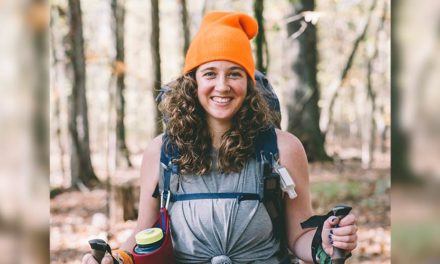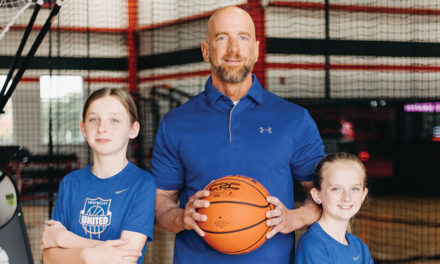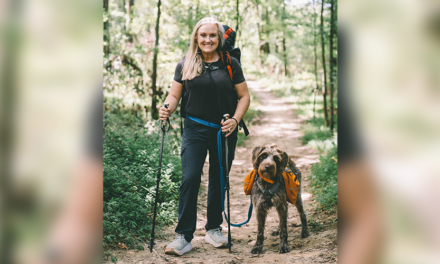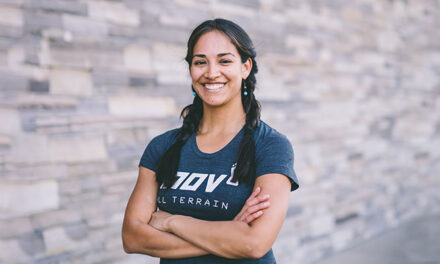Today, 39-year-old Hannah Shipley is a beautiful, confident woman who leads rooms full of students working on their fitness goals and well-being—and she’s well loved for it. She’s a beloved instructor at the Kroc Center with a loyal following as well as a mother of two young boys. If there’s one thing for certain, it’s that she has a lot of energy.
There was plenty of room for Hannah to be active as a young girl growing up in rural Mississippi. “From the time I could walk, I was always climbing trees, doing gymnastics, playing soccer—you name it.” Even though she was voted “Most Athletic” as a senior in high school, she struggled with her body image. Even if she was active, she wasn’t healthy.
Like many young women in their early 20s influenced by pop culture and media, she became fixated on the idea of being thin. In addition to spending hours in the gym, Hannah was running three miles a day and used Adderall to suppress her appetite and maintain focus in school. Food came with guilt, which led to binging and purging.
Hannah recalls, “I couldn’t see my own true reflection in the mirror because I felt that all of my efforts weren’t good enough. I could still pick out areas of my body that weren’t ‘perfect,’ and I was determined to change it.”
The positive attention she received for her weight loss encouraged her toxic relationship with food, exercise, and body image. During the worst days of her eating disorder when she knew that she wasn’t healthy, she hid it from everyone. The realization came when she tried on a pair of jeans from high school and saw exactly how small her frame had become.
Here’s her recovery in her own words:
Why didn’t your friends and family support you?
I didn’t tell a soul! I was so embarrassed by the idea of allowing this silent, controlling force to enter my life and take over. The first person I ever told was my husband after we had been married a few weeks. I knew I had to be honest with him so that he could help keep me accountable if I relapsed. He fully supports me and continues to be affirming when I feel low.
Describe how you recovered.
I wouldn’t say that anyone who has fought an addiction is ever fully recovered. I still hear that small voice in the back of my head from time to time, but I am much more equipped to differentiate between truth and lies. It can lay dormant for a while and then something might trigger it. When that happens—and it will happen—I have to remind myself that my worth isn’t determined by a number on a scale or the gap between my thighs. I go down a list of things that make me who I am, including people that I love and the fact that they would love me no matter what.
What advice do you have for others who have the same signs and symptoms that you did?
Find someone that you can trust to talk to and let them know that you’re struggling. This isn’t something that you can just snap your fingers and figure out; it will take time. Give yourself grace and know that you’re not alone in your struggles.
How did motherhood impact how you viewed health?
It was only after I had my first and was breastfeeding when I began to understand what “healthy” really meant.
How do you approach eating now?
With a fork and knife in my hands! I definitely have a much healthier relationship with food. I know that overdoing it at Thanksgiving or enjoying my birthday week of dinners is something that I deserve to enjoy—not overthink. It’s taken me a while to get here, but I like it and I’m staying! Besides, my husband is too good of a cook! #ribs #twicebakedmacncheese
What do you think of the body positivity movement?
I love it! I love that society has now addressed how we objectified women, and that so much has to be done to change that standard image of beauty. Having dealt with body shaming issues for years, I always try to combat those thoughts when I hear anyone speaking negatively about themselves. It is a good thing to be perfectly imperfect!
What got you into teaching fitness?
My dear friend and Zumba instructor extraordinaire Tracy Humphry invited me to teach a teen girls’ boot camp at the Kroc one summer. After that, I was hooked! I loved watching people push their boundaries and become educated about their health.
What group fitness classes do you teach?
I teach three Les Mills classes: Tone, GRIT, and CXWorx. Tone is 45 minutes of integrated HIIT, steady state, strength, and core training; GRIT is 30 minutes of intense HIIT training; and CXWorx is 30 minutes of core strength training.
How does your history with an eating disorder affect how you teach classes?
I want the people in front of me to feel successful after every class. We’re not all going to go for the burpee tuck jump, and that’s just fine! I want my participants to feel like they’re in a safe space and that I see them. I know that they came to my class to become a healthier person, which provides me the opportunity to build them up mentally as well as physically.
What makes your students love you?
I try to really connect with my people. I want to know what motivates them to come to class—especially now. When I know what motivates someone, I can use that to help push them to break down their own barriers so they become healthier and more fit. Also, I’m a total goofball and I try to maximize the amount of fun in each class!
We hear you’re famous for your eggs!
Ha! I have been raising chickens since I was nine when I was homeschooled. We had horses too, but I really gravitated to hanging out with my chickens since there weren’t any other kids around to play with. I love their quirky personalities, but I also love that they lay delicious eggs! If you ever wanted to try fresh eggs, I’ll be happy to oblige!
By Lillian Kay
Photo by Tindall Stephens







